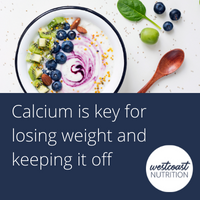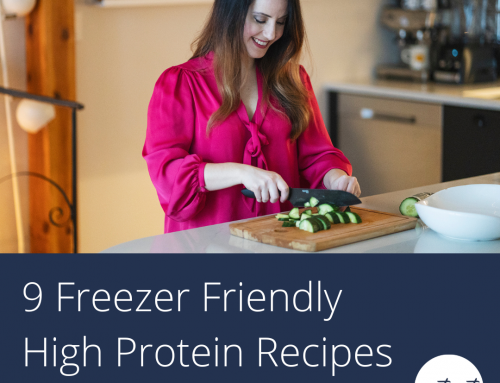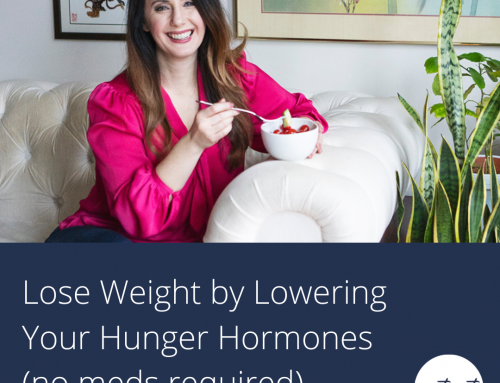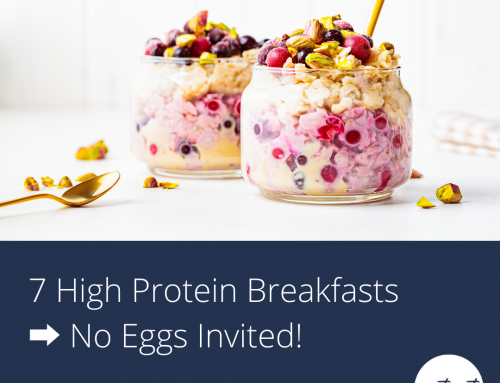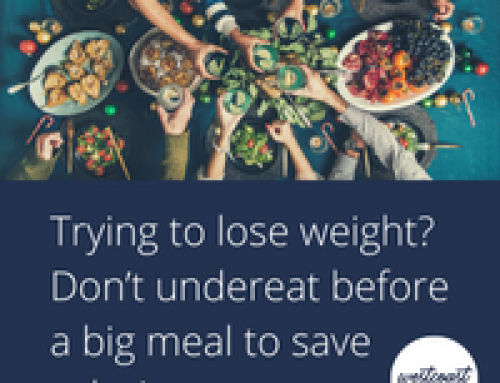Calcium is a key nutrient for losing weight (and keeping it off), not just for bone health! No matter what your goals are, getting enough is key and tricky if you’re not doing 3 or more servings of dairy each day.
When It comes to healthy fat loss, Calcium helps in 3 ways:
- Improves insulin sensitivity – meaning less of what you’re eating is going to fat cells for storage
- Increases lipolysis – that’s the breakdown of fat from our storage cells to use as energy (emptying out the storage locker)
- Decreases lipogenesis – the creation of new fat cells! Given fat cells have a years-long lifespan, decreasing lipogenesis is key for the keeping it off phase.
How much do I need?
How much you need depends on your age and health stage. Your goal is to get the following between your food and supplements:
Men and women 19-50 years old – 1000 mg*
Women 51+ – 1200 mg
* Women who are menopausal before 50 should likely aim for 1200 mg as well
Men 51-70 – 1000 mg
Men 70+ – 1200 mg
Calcium isn’t easy to estimate if you’re not doing a lot of dairy. I love this easy Calcium calculator from Osteoporosis Canada to help clients estimate their usual intake. You could also track a few days worth of food in an app like Cronometer and see where you average out.
Where do I get it?
Like it or not, Calcium is richest in dairy products. Milk, yogurt, kefir and cheese all average about 300 mg per serving which is a nice dent in your daily needs.
If you are lactose intolerant like me, you’re going to want to look for a plant milk that is Calcium fortified (because many aren’t). Look at the facts panel on the back and you should see 200-300 mg of Calcium or 20-20% of the daily value there. If it’s 0-10% it’s not fortified and it’s a good idea to swap to a different brand.
Smaller amounts are found in plant foods including:
- Edamame – 1 cup provides 98 mg
- Tofu – ½ block (~ 120 g) 325 mg
- Black beans – 1 cup provides 119 mg
- Almonds – 20 almonds provides ~66 mg
- Tahini (sesame seed butter) provides ~64 mg
- Pumpkin seeds – ¼ cup provides ~15 mg
- Kale – 1 cup chopped provides 53 mg
- Baby Spinach – 1 cup provides 30 mg
- Broccoli – 1 cup florets provides 33 mg
- Almond, oat, and other plant milks – 1 cup provides 0-300 mg depending on the type
- Coconut and other plant yogurts – 0-400 mg per serving depending on brand
How do I get more?
As you can see, it is tricky to cobble together enough sources throughout the day to hit that 1000 mg (and trying to keep track of what’s in where can be overwhelming). You can sneak more Calcium in by:
- Adding yogurt as one of your daily protein sources or add it to a smoothie for flavour.
- Making a smoothie with milk or kefir instead of water
- Finding a fortified plant milk to use in protein shakes, smoothies or steam a cup with some vanilla for cozy afternoon hydration
- Testing out Greek yogurt or a fortified coconut yogurt with some berries and a few chocolate chips as your “dessert”
- If you’re plant based, including tofu at least a few days a week in stir fries, curries, or even scrambled for breakfast
- Spreading tahini on your toast instead of peanut butter
What about supplements?
Most clients (and myself) end up needing a Calcium supplement to meet their needs – it can be hard to get enough if you’re not a big dairy eater or you don’t have a lot of calories to spend on random sources. There’s nothing wrong with needing some help!
The goal is to top up your usual food intake to the goals above. So fill out your Calcium Calculator to see how much you typically get and then use a supplement to fill in the rest.
Caution here – more is not better when it comes to supplemental Calcium. Like most nutrients, we want to hit the sweet spot, not overdo it. Long term high intake of Calcium supplements (beyond what you need) may actually contribute to plaques in arteries and heart disease so be judicious here. This is one supplement where brand isn’t super important – so something basic from your local pharmacy should do the trick.
So here’s your nudge to figure out how much Calcium you’re getting and top it up with food or supplements – there’s no one right fit, just what works for you!
Need some help getting your meals for the week balanced and prepared? If you’d like to receive our free Meal Planning Getting Started Guide AND get in on our weekly emails about all things nutrition so you can get clarity and confidence on what you’re eating, join us here!


